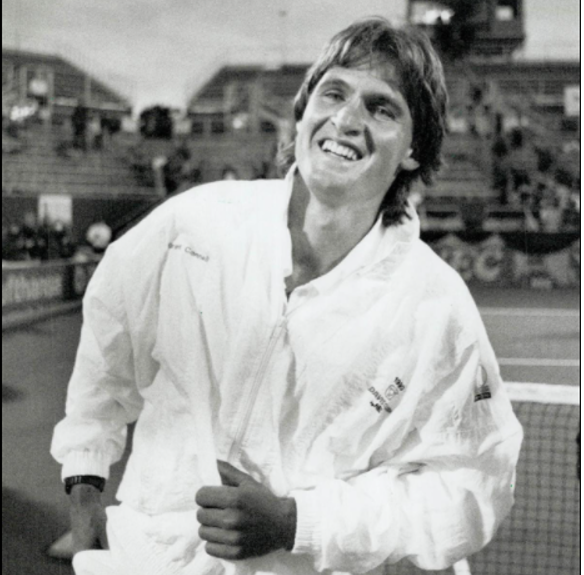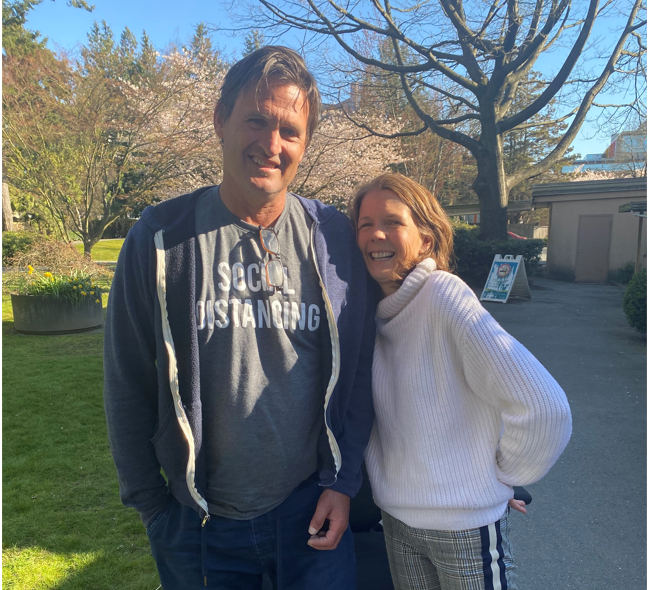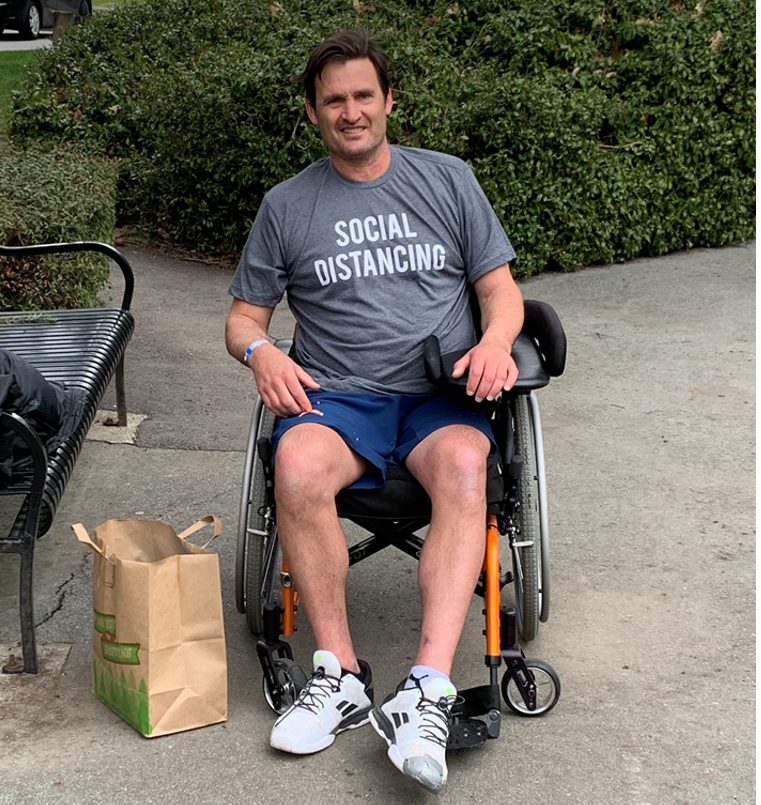[ad_1]
Out jogging alongside the seawall in Vancouver’s Stanley Park, Grant Connell felt disorientated and unable to carry onto his cellphone earlier than tumbling to the bottom finish over finish. When he managed to get himself up onto a bench, his first thought was, “I hope it’s a coronary heart assault.”
Connell, 54 on the time, had been delinquent in taking his hypertension medicine and knew {that a} worse self-diagnosis than cardiac arrest can be that he was having a stroke.
It was February 19, 2020, and he was certainly having a stroke. At first, he was hesitant to ask for assist as a result of he feared folks would suppose he was drunk.
Luckily, somebody provided to assist and he instantly requested them to name 911. Fading out and in of consciousness, he remembers quickly listening to a (ambulance) siren and pondering, as he lay on his again on a concrete path, “Oh man I even have an opportunity right here,” earlier than passing out.
A world-class participant who ranked as excessive as No. 67 in singles, defeated champions akin to Ivan Lendl, Jim Courier and Andres Gomez, was No. 1 within the ATP doubles rankings for 17 weeks and performed in three Wimbledon doubles finals, Connell was dealing with a problem in contrast to any he encountered in 12 years on the professional tennis tour.
“After I was introduced into the ambulance,” he recollects, “I heard them yelling to get a vein and somebody shaking me and asking me for my subsequent of kin. Then I blacked out and I feel I used to be out for possibly 12 hours or one thing.”
When his spouse Sarah bought to the hospital, the top nurse within the ICU mentioned to her, “hear Mrs. Connell, in case your husband wakes up he’ll by no means stroll once more.”
His blood strain was over 200 and initially, medicine didn’t get it beneath management. “I heard one nurse say, in the course of the evening when she was my chart, ‘I’ve by no means seen a lot blood strain medicine in a single human being in my life,’” he remembers.
After two days the quantity lastly got here down. He had regained consciousness and was decided to show that head nurse mistaken. “I by no means thought that I wasn’t going to have the ability to stroll,” he says. “It was actually tough to discover ways to do it once more – however that was one thing I by no means thought-about.”
Right now, two years later, he walks with a limp and nonetheless has very restricted use of his left-side (he’s a lefty) arm and hand.
However greater than any bodily ails, Connell’s first response upon coming to in that mattress on the Vancouver Common Hospital was recognizing that his psychological and emotional schools had been nonetheless intact.
“I used to be joyful that I may perceive folks and that they may perceive me and that my mind was nonetheless functioning nicely, my reminiscence was good,” he says. “I had achieved analysis on stroke (there’s additionally a household historical past) and did know that you would go blind – my left eye is broken (24 per cent imaginative and prescient) so I can’t drive. But when the blood is on prime of your mind – versus mine which was an inner-cranial mind bleed – if it’s on prime, that’s when it actually fries your connections and also you’re achieved.”
Connell was removed from achieved and, after a month within the hospital, he was transferred to a rehab residence and was not capable of return residence for one more three months till the top of Might.
His restoration has been sluggish and laboured however at the moment he goes for 5 to 10-kilometre walks and has been again working in his Vancouver realty enterprise since six months after the stroke.
“Realtors are impartial contractors anyway,” Connell says about his job. “I’ve been within the enterprise for 20 years and I’ve truly had a reasonably profitable two years now.”
With attribute Connell mischievous humour, he provides, “I are inclined to name it a handi-perks. The perks of being handicapped. I is perhaps getting a bit extra enterprise than I usually would. It will get me out. I Uber so much, and I’m not averse to taking the bus.”
Throughout his profession, a spotlight was nearly singlehandedly lifting Canada to the World Group of Davis Cup for the primary time by profitable all 9 units – two singles and the doubles with Glenn Michibata – in opposition to the Netherlands (Paul Haarhuis and Mark Koevermans) on a memorable, chilly, late-September weekend in 1990 on the Nationwide Tennis Centre in Toronto (image beneath).

After retiring in 1997, Connell was government director of Tennis British Columbia from 1998-2003, Davis Cup captain from 2001 to 2004 and match director of the Canadian Open (Rogers Cup) in Toronto in 2006, all of the whereas beginning a work-life away from the game. “I can by no means complain about being neglected once they discuss Canadian tennis gamers as a result of I actually took myself out of it,” he says, “purposely went on looking for myself exterior of tennis – with a household after which a profession. I used to be by no means one in every of these guys who likes to look again. I prefer to look ahead.”
He stays in shut contact with tennis contemporaries and lots of of them rallied round him when he had the stroke. “There’s a WhatsApp group known as ‘Grant’s tennis mates’ that (former doubles associate from Tacoma, Washington) Patrick Galbraith arrange. There are about 30 of us from the tour once I performed – guys like Glenn Michibata, Todd Martin, (Jonathan) Stark, (Byron) Black and (Patrick) Rafter – simply us going forwards and backwards each few weeks.
“After I was within the hospital, I used to be on it each day chatting with folks. The worldwide tennis neighborhood was unimaginable.”
There’s one tennis reminiscence that many Connell followers have from his profession – a 4-6, 6-1, 6-7(6), 7-5, 6-3 loss to Andre Agassi within the first spherical at Wimbledon in 1991. Agassi had a net-cord ball trickle over for him dealing with a break level that will have allowed Connell to serve for the match within the subsequent sport. Agassi went on to succeed in the quarter-finals. However had Connell received the match, it’s uncertain the American, a Wimbledon grass skeptic with a match report there of 0-1 on the time, would have had the boldness to make a career-changing breakthrough and win the title the next yr.
“He (Agassi) wrote about that in his e book (‘OPEN’) and I snicker as a result of I bought extra consideration from two traces within the e book than I did in my entire profession,” Connell says. “I used to be in Hawaii with some mates when that e book got here out. Everybody was studying it and I jokingly mentioned, ‘I may put a marker in my hand and open to the web page and simply signal it and shut it.’”
It reminded him of one other Agassi story – from 1990 when he misplaced 6-4, 6-2, 6-2 to the flamboyant Las Vegan within the first spherical of the US Open. Recollects the self-deprecating Connell, “(The late) Vitas Gerulaitis, once I was taking part in Agassi on the US Open, mentioned, ‘that is like watching the tortoise and the hare – and the tortoise doesn’t win.’”
In so some ways Connell has received – notably along with his household. Daughter Madison, 23, graduated from Stanford and now works in San Francisco, daughter Charlotte, 19, is presently learning at McGill in Montreal and son Cooper (his Bermudian mom’s maiden identify), 20, is at Bentley College in Waltham, Mass. close to Boston, on a hockey scholarship learning enterprise. His two youngest – 15-year-old equivalent twins Bella and Katie – are in grade 10 in West Vancouver.
Connell, spouse Sarah and the 5 youngsters went to Wimbledon in 2019 (image at prime) and, in Connell’s phrases, “had a lot enjoyable.”
He couldn’t assist himself, joking, “it was humorous watching my underage youngsters ingesting Pimms (the gin-based liqueur synonymous with Wimbledon) with their mates.”
Son Cooper turns 21 in July and Connell plans to go to this yr’s US Open with him to rejoice.

Again to his present bodily actuality, Connell says, “I’m fairly restricted. I can mow the garden fairly gingerly however I don’t have the stability to play tennis or issues like that. I don’t rule it out – it’s been two years. They let you know to grind away for a few years after which do no matter you want form of factor. I’ve the best physio and I’m going three days per week and I’m seeing incremental enchancment in my hand and my arm. So it provides me cause to imagine I can get 10 per cent, 15 per cent, 20 per cent higher.”

Grant Connell – tennis participant and all-around good man – was captured in these last paragraphs from a September, 1997, column in The Globe and Mail on the event of his retirement.
Connell’s wit and irreverence are his calling playing cards, and instance is when he obtained his doubles runners-up prize within the Royal Field from the Duchess of Kent at Wimbledon in 1993. That yr – memorable for Jana Novotna sobbing on the Duchess’s shoulder after blowing a third-set lead within the ladies’s last in opposition to Steffi Graf – Connell had a bit of chat with the Duchess. “She was very personable and pleasant,” he recalled. “So I turned to her and mentioned, ‘Don’t fear, I received’t cry in your shoulder.’ She smiled and mentioned, ‘Oh thanks, I hope not.’”
From the corps of retired gents who labored as volunteer drivers in the course of the Davis Cup (Ed. Be aware: September, 1997, in Montreal) and who gathered round Connell as if he was one in every of their previous friends, to the girl who arranges participant interviews at Wimbledon and who lately remarked, “Grant Connell, he’s our favorite,” the 31-year-old from Vancouver has legions of admirers.
A type of is long-time good friend and former fellow-player Martin Laurendeau from Montreal. “I’ve essentially the most superb spouse and 5 youngsters and mates and neighborhood right here,” Connell says. “I noticed Marty the opposite day and we had nice laughs. I feel I put folks comfortable fairly shortly as a result of I can joke about issues. And truthfully, via this entire course of, it’s been alright. I’m so, so fortunate that I wakened joyful and grateful, unbelievably grateful – extra in love with my spouse and youngsters than ever earlier than. The blood may have manifested itself in many various methods. And once I was on the rehab hospital I noticed many individuals with comparable strokes they usually had been completely depressing. I used to be simply so fortunate in the place the blood landed that it didn’t have an effect on my moods or my outlook on life or something like that – if something it enhanced my gratitude for all times.”
[ad_2]
Source link


